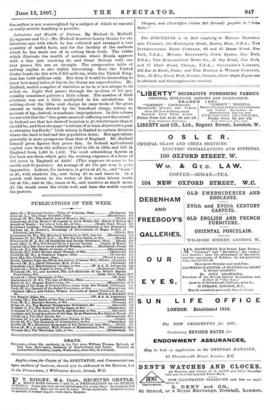Industries and Wealth of Nations. By Michael G. Iffulhall. (Longmans
and Co )—Mr. Mulhall deserves hearty thanks for the laborious care with which he has collected and arranged a vast quantity of useful facts, and for the lucidity of the methods which he has made use of in setting them forth. The tables which illustrate the wealth of nations, where Russia appears with a line just reaching 60, and Great Britain with one that passes 330, are an example. The comparative table of railway capital is also highly interesting. Here the United States heads the list with 2.300 millions, while the United King- dom has 1,000 millions only. But then it would be interesting to know how manimiles of line in the States are unproductive. Mr. Mulhall, useful compiler of statistics as he is, is not always to be relied on. Light that passes through the medium of his per- sonality sometimes gathers a little colour. The number of Irish evictions was not a little multiplied in his calculations. In writing about the tithe rent charge he once wrote of the gross amount as being divided by the beneficed clergy, taking no account of lay, clerical, or academic impropriators. In this volume we are told that the "two great causes of suffering and-discontent " in Ireland are that her share of taxation is 41,800,000 more than it should be, and that she pays "a tribute of at least 42,000,000 a year to absentee landlords." Irish misery is limited to certain districts where the land is bad and the population dense. Her agriculture generally is more prosperous than that of England. Mr. Mulhall himself gives figures that prove this. In Ireland agricultural capital rose from 341 millions in 1846 to 391 in 1894, and fell in England from 1,486 to 1,452. The most astonishing figures in the book are those which give the working expenses of a farm of 100 acres in England at £450! (This supposes 4(1 acres to be arable and 60 pasture.) An average of 44 10s. per acre is quite impossible. Labour, for instance, is given at 41 5s., and " team " at .21, with sundries 138., rent being 41 48. and taxes 8s. In a parish well known to the writer of this notice labour works out at 138., rent at 12s., taxes at 3s., and sundries as much more. 41 158. would cover the whole well, and here- the arable equals the pasture.


































 Previous page
Previous page